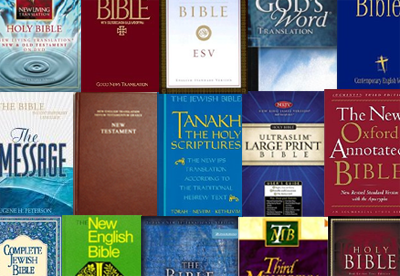 People often ask, “What is the best Bible translation?”
People often ask, “What is the best Bible translation?”
As I indicated yesterday, there really is no best Bible translation. The best Bible translation all depends on what you want to accomplish with your Bible reading, devotional habits, or study plan. Other factors to consider are whether or not you will be preaching or teaching the Bible to others, or whether you are just reading the Bible for understanding and inspiration.
But here is my basic simple guide for helping you pick the best Bible translation for your purposes and goals.
The Best Bible Translation for Preaching and Teaching
I would recommend one of the following:
- New King James Version (NKJV)
- New American Standard (NAS)
- English Standard Version (ESV)
- Revised Standard Version (RSV).
These all are quite accurate translations of the Biblical text, and so are good for preaching and teaching. As you look at these Bible translations in the charts below, you can see that they all fall on the “Formal Equivalent” or “Word for Word’ approach to translation, rather than the “Dynamic Equivalent” or “Paraphrase” approach.
However, I think that when most people ask about the best Bible translation, they are probably not pastors or teachers, and simply want to read the Bible and learn what God says in Scripture.
The Best Bible Translation for Reading and Personal Devotions
So when I recommend the best Bible translations for reading and personal devotions, I often recommend one of the following:
- New King James Version (NKJV)
- New International Version (NIV)
- New Living Translation (NLT)
I know that most might think that the NLT is a paraphrase, but this is because of it’s similarity with “The Living Bible” which is a true paraphrase. The New Living Translation is an actual translation of the Bible in the “Dynamic Equivalent” approach
Now, there is a third category of best Bible translations, and it this:
The Best Bible Translation for Tradition and Religious Tone
By far, the best Bible translation for the tradition of Christianity is the King James Version. It is highly poetic, and most religious traditions and religious rites were written using the King James Version of the Bible.
So which one is truly the Best Bible Translation?
Really, the best Bible translation is the one you enjoy reading.
The best Bible translation will be the one that, when you are reading it, you forget you are reading “the Bible.” The one that, when you are reading it, you don’t have an urge to pull out a Bible Dictionary, or put together an outline for your next sermon. The one that, when you are reading it, you forget to “look for the main point” and just enjoy the story, the poetry, or the letter which is being read.
I suggest spending several hours (yes, that is how long it will take), and go down to a local Christian bookstore, getting a cup of coffee, and pulling all the Bible translations off the shelf and then just flip them open and start reading. The one that you have trouble putting down is the best Bible translation for you.
Lots of people who have done this find that Eugene Peterson’s The Message is the best Bible translation for them, but I could never really get into that version.
For myself, I chose the New King James Version. I felt that it had the accuracy I wanted for my preaching, teaching, and study, the readability of some of the other translations, and the style of the traditional King James. This is the best Bible translation for me, and is the one I have been using now for almost 20 years.
A young girl once wrote a letter to C. S. Lewis complaining about “silly adventure stories without any point.” He wrote back (as he did with all the letters he received from children), saying this:
I’m not quite sure what you meant about “silly adventure stories without any point.” If they are silly, then having a point won’t save them. But if they are good in themselves, and if by a “point” you mean some truth about the real world which one can take out of the story, I’m not sure that I agree.
At least, I think that looking for a “point” in that sense may prevent one sometimes from getting the real effect of the story in itself — like listening too hard for the words in singing which isn’t meant to be listened to that way (like an anthem in a chorus). –From Letters to Children, p. 35.
So which is the best Bible translationt? The one you can read without “looking for the point.” I think that in some sense, Bible study methods and Hermeneutics have ruined the Bible. It would be far better if most of us just read the Bible to get the “real effect of the story in itself.” I encourage picking a Bible translation which will help do that for you. For this, I usually recommend the NLT, The Message, but if you also want to study and teach the Bible, then I highly recommend the NKJV.
For those of you who want a more detailed explanation of the various Bible translations, and the strengths and weaknesses of each, here are some charts and graphs.
Bible Translation Charts and Graphs
This first chart is for “literal” translations. Those near the top try to translate each Greek and Hebrew word literally, and as close as possible to the original word order. Of course, that makes them somewhat difficult to read and understand. Those at the bottom are considered “paraphrases.” They take the idea of a sentence or paragraph, and then try to express that idea in modern language.
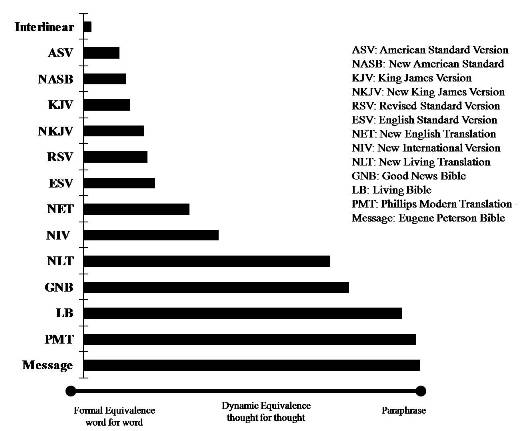
The following chart is similar to the one above, but shows it a little differently.
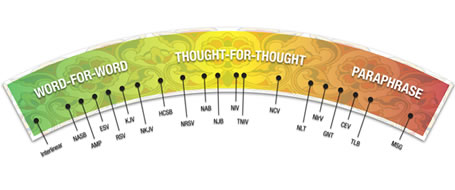
The following chart shows where our translations came from, and how the translations relate to one another. You see that although many translations try to be straight from the Greek or Hebrew, they also build on previous translations, so that if a particular translation has a long tradition, the tradition might get carried forward, even if that way of translating the word or idea is not the best.
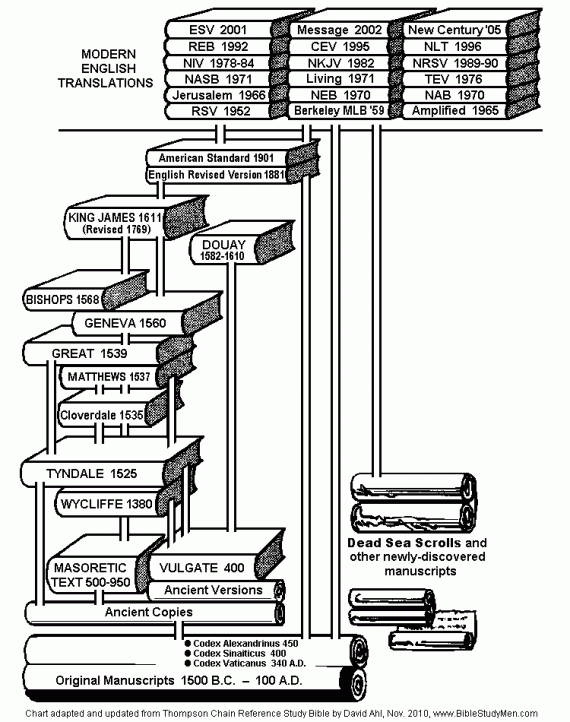
I included the following chart because I thought it was funny. It is not helpful for me at all. It is no wonder that people are confused about Bible translations when they see something like this. Of course, the rest of the charts may not be that helpful either….
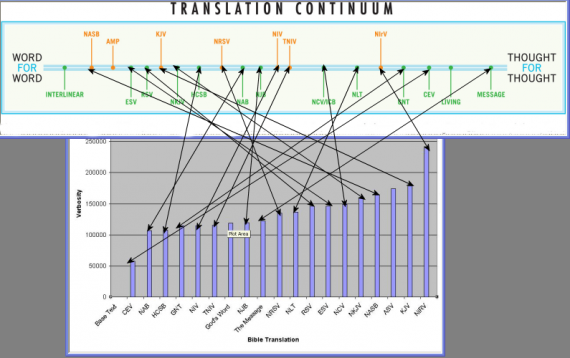
Finally, here is a chart which briefly describes the style and features of various translations, and then gives a sample verse for comparison.
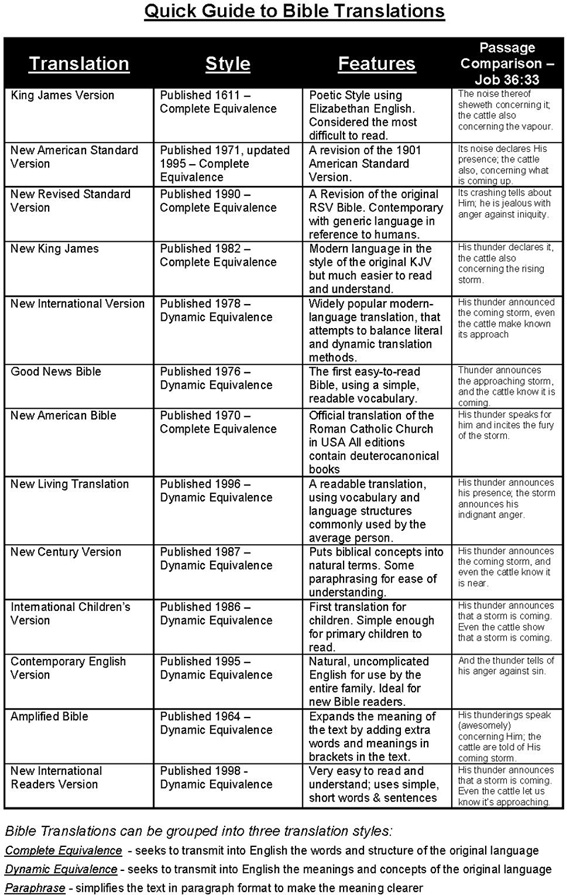
So which Bible translation do you use, and why do you use it? What do you think is the best Bible translation?


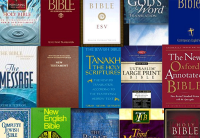







 When I first began to examine the doctrine of the Inspiration of Scripture, it was because I saw so much Bible-abuse in our churches and from our pulpits, that is, people, pastors, and even seminary professors using the Bible in ways that made me extremely uncomfortable. Their approach often seemed to boil down to the simple idea that “God said it. I believe it. That settles it.”
When I first began to examine the doctrine of the Inspiration of Scripture, it was because I saw so much Bible-abuse in our churches and from our pulpits, that is, people, pastors, and even seminary professors using the Bible in ways that made me extremely uncomfortable. Their approach often seemed to boil down to the simple idea that “God said it. I believe it. That settles it.”